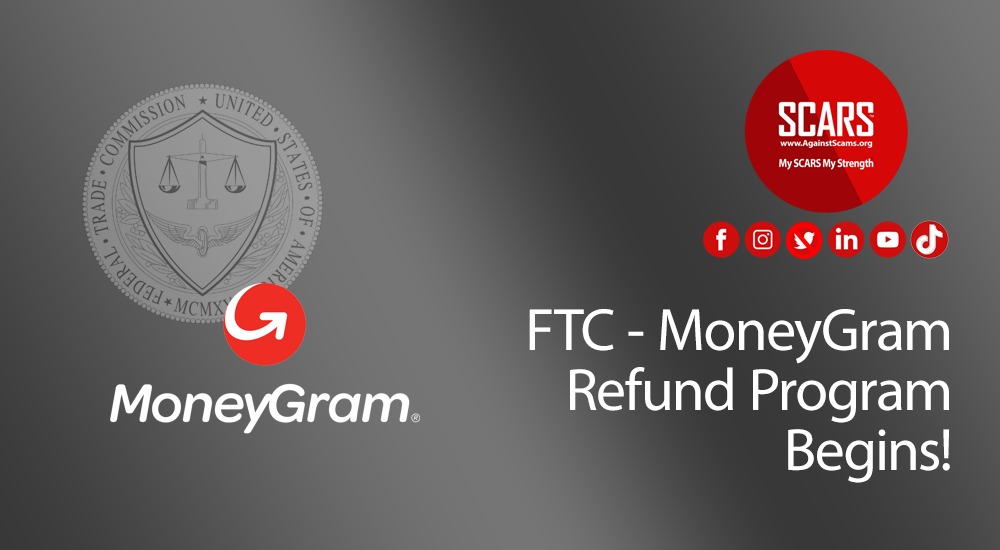MoneyGram Refunds Finally Flowing To Victims
More than $115 Million in MoneyGram Refunds Sent to Consumers as a Result of FTC, DOJ Charges That MoneyGram Failed to Crack Down on Scams
MoneyGram Refunds Stem From 2018 Action Alleging The Company Violated Previous Orders
More than $115 million in MoneyGram refunds are being sent to consumers nationwide as a result of a 2018 action the Federal Trade Commission and the U.S. Department of Justice brought against MoneyGram for failing to crack down on scammers using their payment system.
The 2018 action charged that MoneyGram violated an FTC settlement from 2009, along with a 2012 DOJ agreement in which the company agreed to take proactive steps to reduce scammers’ ability to use their payment system to receive money from consumers.
“MoneyGram violated an FTC order by continuing to let scammers rip off its customers,” said Samuel Levine, Director of the FTC’s Bureau of Consumer Protection. “The FTC is pleased to be working with our law enforcement partners to provide refunds to claimants. Other firms that facilitate fraud and ignore FTC orders should expect to face similar consequences.”
“This distribution of $115.8 million to nearly 40,000 victims—each of whom is being fully compensated for their losses—demonstrates the Department of Justice’s continued commitment to making victims whole,” said Assistant Attorney General Kenneth A. Polite, Jr. of the Justice Department’s Criminal Division. “This is an example of how the Department will use every tool at its disposal, including in corporate criminal matters, to provide justice to victims.”
“This $115 million MoneyGram Refunds disbursement provides a measure of financial justice for the many victims who were harmed by fraudsters who preyed on them,” said Inspector in Charge Christopher A. Nielsen, U.S. Postal Inspection Service, Philadelphia Division. “The U.S. Postal Inspection Service is proud to be part of this exemplary collaborative effort with our law enforcement and regulatory partners, particularly the U.S. Attorney’s Office for the Middle District of Pennsylvania, the DOJ Money Laundering and Asset Recovery Section and the Federal Trade Commission, to facilitate a process where victims are delivered restitution.”
In the 2009 settlement with the FTC, MoneyGram agreed to put in place a fraud prevention program which, among other things, required the company to promptly investigate, restrict, suspend, and terminate high-fraud agents. The FTC charged that MoneyGram was aware of continued fraud on their payment network after the settlement, turning a blind eye for years to numerous instances of suspicious payment activity by the company’s agents.
Consumers receiving MoneyGram refunds in this distribution are limited to those who submitted claims during the open claims process in 2021.
More information about the MoneyGram refund program and its compensation to consumers who were harmed is available on DOJ’s MoneyGram remission website https://moneygramremission.com. Further questions may be directed to DOJ’s MoneyGram Remission Administrator by phone at 844-269-2630 or by email at info@moneygramremission.com
-/ 30 /-
What do you think about this?
Please share your thoughts in a comment below!
Do You Need Support?
Get It Now!
SCARS provides the leading Support & Recovery program for relationship scam victims – completely FREE!
Our managed peer support groups allow victims to talk to other survivors and recover in the most experienced environment possible, for as long as they need. Recovery takes as long as it takes – we put no limits on our support!
SCARS is the most trusted support & education provider in the world. Our team is certified in trauma-informed care, grief counseling, and so much more!
To apply to join our groups visit support.AgainstScams.org
We also offer separate support groups for family & friends too.
Become a
SCARS STAR™ Member
SCARS offers memberships in our STAR program, which includes many benefits for a very low annual membership fee!
SCARS STAR Membership benefits include:
- FREE Counseling or Therapy Benefit from our partner BetterHelp.com
- Exclusive members-only content & publications
- Discounts on SCARS Self-Help Books Save
- And more!
To learn more about the SCARS STAR Membership visit membership.AgainstScams.org
To become a SCARS STAR Member right now visit join.AgainstScams.org
To Learn More Also Look At Our Article Catalogs
Scam & Crime Types
More SCARS
- ScamsNOW Magazine – ScamsNOW.com
- ContraEstafas.org
- ScammerPhotos.com
- AnyScam.com – reporting
- AgainstScams.org – SCARS Corporate Website
- SCARS YouTube Video Channel













Leave A Comment